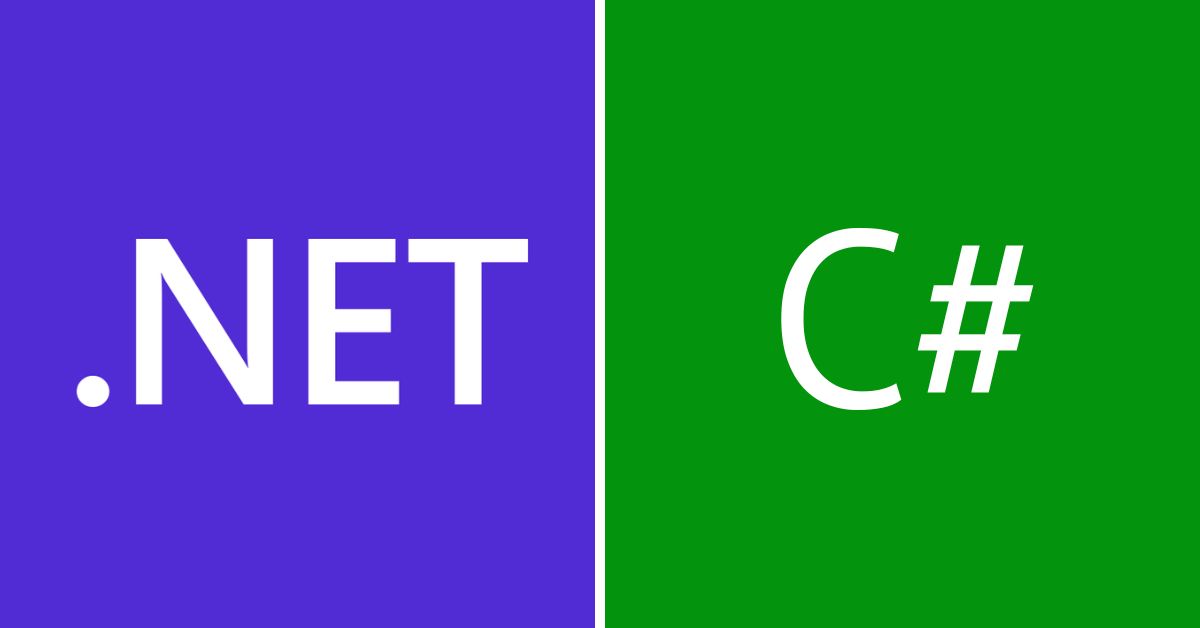When browsing programming or software job openings, it can be common to see them asking for proficiency in .NET and C#, but what are the differences between .NET vs C# on a practical level?
.NET is an overall framework and runtime environment that is mostly coded with C#, and C# can be used to program applications. The two are very similar and related, but different as C# is a programming language, whereas .NET is more of a blanket term.
Let’s look at what .NET is and what C# is, as well as their similarities and differences as well as their respective pros and cons. In the end the terms are often used interchangeably although there are rather significant differences to be aware of.
What Is .NET?
A free and cross-platform developer platform, it is meant for building many different types of applications for open source usages. Essentially it is a large amount of related frameworks and software tools that allow a wide variety of software features and services.
.NET is flexible in that you can use multiple languages and editors to compile a wide variety of applications including web, mobile, desktop, games, Internet of Things (‘IoT’), and more.
.NET apps can be written in a large variety of common languages, such as C#, F#, or Visual Basic and will run on any compatible operating system that works with these languages.
.NET has a big advantage in that it provides a standard set of base class libraries, which are common to all .NET applications and Application Programming Interfaces (‘API’). However, even this is not a limitation as there are cross-platform web frameworks like ASP.NET.
In terms of libraries, there are many to choose from but NuGet is a package manager built specifically for .NET that contains over 100,000 packages to make development easier.
In the end, the main pros of it are its wide adoption and usage, meaning many developers can rely on it when making specific applications as it will fit into the wider .NET ecosystem.
.NET has some big advantages, such as using object-oriented programming (‘OOP’). This allows the pieces of software to be divided into smaller chunks and then combined later.
OOP gathers data into units named objects, allowing them to be built, managed, and combined.
Caching data is often a problem with software and has to be worked around, but .NET comes with a caching system.
The Visual Studio Integrated Development Environment (‘IDE’) is another great benefit, as it gives applications debugging and publishing tools compatible with many different operating systems and multiple platforms, even mobile.
Further, the large community of people familiar with and knowledgeable of .NET means you can easily find people who have a lot of experience in the framework, meaning development is not so painful and is also easy to design for cross-compatibility.
This has been the case since the acquisition in 2016 of cross-platform proprietary technology Xamarin, which expanded the ecosystem of the platform, and significantly increased its ability to run across multiple platforms and systems.
Finally, the modular design of .NET stops developers from needing to go through pages of code and script, which is originally what .NET was created to solve. It allows developers to easily fix or update the parts of the application and then run it again.
Otherwise, finding that one piece of code which is causing the program to fail or crash can be a real pain.
The cons of .NET are that the OOP framework is not as flexible, and leads to vendor lock-in to Microsoft. Licensing fees can also stack up, which is not out of the ordinary but .NET is supposed to be open source which tends to mean low or no fees.
Also, new features or new updates can run into the issue of a lack of documentation or support available. While this can jeopardize the stability of a project, it is not necessarily a major issue that can’t be overcome.
What Is C#?
C# (pronounced sea sharp) is a general purpose OOP language that was released in 2000 by Microsoft as an update on C++.
C# is the language behind major Windows desktop applications and is a compiled language, meaning it has to be compiled into an intermediate language (‘IL’). This means that C# is not a scripting language.
This allows much better performance.
Due to its widespread use, it is compatible with many applications including Visual Basic, Windows PowerShell, C++, and F#.
You can even find C# in game engines, such as Unity, enabling the creation of games even by people not familiar with coding.
C# is also what is referred to as a high-level language, which means it is not as abstract as other programming languages. This means it is the simpler syntax to understand and manage as it is similar to human languages.
This can also be a downside, as due to this level of abstraction it cannot access memory directly and so has a limited range of pointer features.
What Are the Differences Between .NET and C#?
While both technologies are often seen as inseparable, they do have some differences.
C# is a programming language, whereas .NET is more of a blanket term that covers many things such as the .NET Framework and the Common Language Runtime (‘CLR’).
CLR is the environment in which .NET assemblies are run. Some analogies are that C# is the airplane, and .NET is the runway that the airplane uses.
To use C# properly, you generally need some knowledge of .NET as the C# object model corresponds to the .NET object model. The usage of .NET libraries enables a variety of applications in C#.
However, other languages can be used to write .NET applications.
How Are C# and .NET Related?
.NET is a framework, containing libraries of existing code and architecture. This gives .NET a sort of solid framework from which many applications can be built on easily.
Most of the .NET framework is itself written in C# but you will find elements written in Visual Basic.
C# is a language that gets a lot of advantages when run in the .NET framework. NOTE: Visual Basic is also a .NET language and choosing between C# and VB is simply a matter of preference.
.NET is thus a total programming environment that not only includes a virtual machine, the CLR, but also an extensive class library.
C# is a programming language that is specifically built for the .NET environment. It is compiled to IL which is a kind of assembly language that is executed in the CLR and uses the Base Class Library classes.
Because .NET is a framework, it works by referencing code in the framework itself.
This has the advantage that the clients running your program just need the .NET framework, which comes natively on many Windows-based operating systems.
It’s very easy to find yourself using both C# and .NET without even noticing it due to their interlinked nature.
However, there are times when C# is used but not executed using the .NET framework. This could happen when using Bridge.NET as that compiles C# code into JavaScript to be run in a browser
This is possible as you can write C# applications for different targets apart from the .NET runtime environment.


